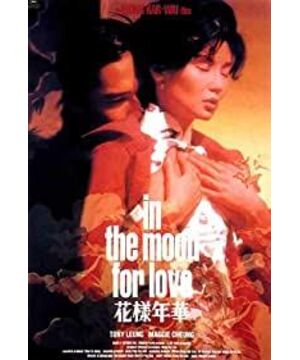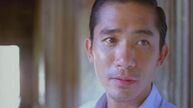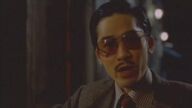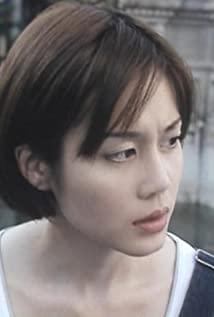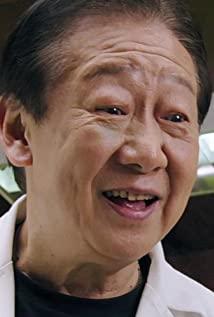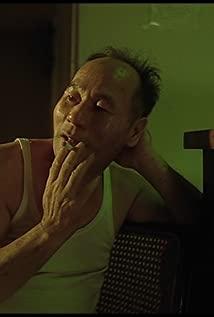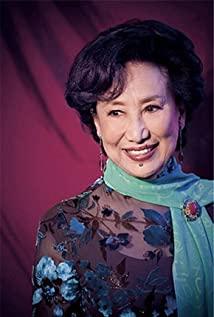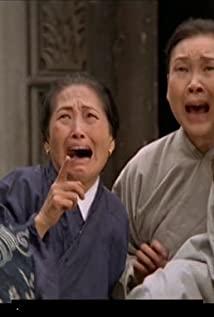I re-watched "In the Mood for Love" and checked the records and found that I had watched it twice in 2001 and 2006 respectively. This time I watched it more understandably and enjoyed more than the previous two times. The so-called art—pictures, music, texts, movies, etc.—are artists who want to express their innermost feelings. Some express their expectations of understanding, and some even have no expectations of understanding. They just tell the world that I feel it, I see it, and I express it. . Let the world understand the rare part that humans are different from beasts: aesthetic sensibility and unique thinking ability. This is also the reason why I love to watch literary movies: sometimes I want to cross the screen and shake hands with the creator to tell him how excited he is to convey what I can’t convey. Sometimes I am shocked. There are such people in the world. My life has greatly satisfied my curiosity, and let me know how big the world is and how different people are from each other, and that it is no longer a frog in the bottom of a well—this is the feeling that most French movies give me.
Like Bruce Lee, Johnnie To, Stephen Chow, Wong Kar-wai has also used his own efforts to promote Hong Kong films, especially literary and artistic films, to the world, and he has made considerable achievements. I have always had a very, very curious question: why does Hong Kong produce Wong Kar Wai? There is only one. I like Hong Kong movies crazily because the market of Hong Kong movies is lively, popular, and even shallow, as the research experts say, "everyone is crazy." Wong Kar-wai is definitely a different kind of Hong Kong movies. It is the opposite of Hong Kong movies. Each of his movies is so restrained, refined and exquisite.
"In the Mood for Love" tells an extramarital affair that ends in esteem. With this story, Hong Kong was photographed before the leftist riots in 66 years after the 49-year migration. From the font chosen in the film, the nostalgia for an era is here we go. That was the period when Shanghai political and business scholars moved to Hong Kong to avoid disaster, and it was the period when Jin Yong left the left newspaper to run Ming Pao. It has been a few days since the war ended. Hong Kong continued its colonial glory and accepted the culture and capital of the southern writers and merchants who avoided disasters. It was a period of peace when things collided and combined. Six or seven is next.
Wong Kar-wai’s movie is very Hong Kong and very Chinese. It is meticulously crafted in photography and art, and vividly restores that era. At that time, Hong Kong continued the Chinese tradition of the arrogant and Qing Dynasty without separation. The women are beautiful and want to promote. The cheongsam and the men's three-piece suits are very decent, whether it is a big family or Zhou Muyun and Su Lizhen, who rents a corner of a tenement house. The intimacy and courtesy estrangement between people are the mature expression of Chinese "rituals" in that era.
The emotions of the two are even more representative of the East. From ambiguous to clear, it takes the length of the whole play. And finally showed that the choice after the mind was to avoid it. The confession in the heavy rain is very classic, and the film language is also very straightforward: standing under the eaves of an old building in the common pouring rain in Hong Kong, Zhou Muyun confessed everything to Su Lizhen, the words are calm and the heart is very surging. It took a lot of courage, and finally finished, the rain stopped, the ticking of the eaves and the sound of the water lingered, the re-emerged sun was rippling in the accumulated water on the ground, reflecting the ups and downs of the two people's trendy ups and downs until they finally broke through. Behind that layer of window paper was a bit of happiness and excitement, melancholy and sadness.
Then, when the dark clouds of June 7 were approaching, Zhou Muyun was transferred to Singapore (Jin Yong was also included on the assassination list at that time and had to avoid Singapore until he returned a year later). The landlord’s wife packed up and left the chaotic Hong Kong to avoid chaos in the United States. When he came back, it had subsided, but things were wrong. The feeling that has no beginning and no ending can only be cherished in the heart and confided to the tree hole.
After re-watching "In the Mood for Love" I can better understand that Wong Kar-wai spent ten years in filming "The Great Master". Just as in "In the Mood for Love", he rebuilt a Hong Kong that Wong Kar-wai and Liu Yichang missed. He also rebuilt it in "The Great Master". A real country of etiquette, China is permeated with the charm of oriental culture. Therefore, "In the Mood for Love" is widely acclaimed in the international film industry. Both professionals and ordinary people like this film very much and have won numerous awards.
That Hong Kong and that China are not only the phantoms that existed in the movies, they have existed for real, just by mistake, a beautiful era was destroyed and passed away. Before I knew it, almost all the good things disappeared little by little: aesthetics, etiquette, and the relationship between people were almost destroyed. In these two movies, Wong Kar-wai restored us to the beautiful era, and also restored to foreigners a lost China and a lost Hong Kong. In my opinion, this is really patriotic.
Before Zhou Muyun left Hong Kong, there was a subtitle in the film: "That era has passed, and everything belonging to that era does not exist." Today, the fate of Hong Kong has reached another intersection. The baptism of modern civilization, the brilliance of the intersection of east and west, will be hard to beat. Soon we have to experience Hong Kong as we live today from the movie. It is embarrassing and helpless to want to come. Only the culture is immortal, and the spirit is immortal to comfort you.
View more about In the Mood for Love reviews


